 Image search results - "fuchu" Image search results - "fuchu" |
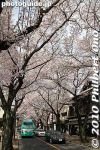
Way to Tama Cemetery. One of Tokyo's major cemeteries with the graves of celebrated figures including politicians, scholars, and novelists. Also a noted cherry blossom spot in spring.
|
|
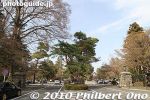
Front entrance to Tama Cemetery.
|
|
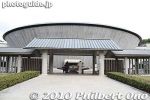
Mitama-do Hall
|
|
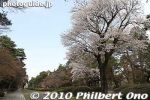
The cemetery is basically in a grid pattern.
|
|
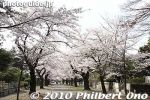
The main roads have cherry trees.
|
|
|
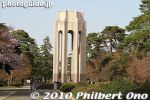
Tama Cemetery Fountain tower.
|
|
|
|
|

Memorial plaque in Japanese and English.
|
|
|
|
|
|

Empty grave plot.
|
|
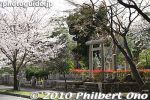
Torii gate at this gravesite.
|
|
|
|
|
|
|
|
|
|
|
|
|
|
|
|
|
|
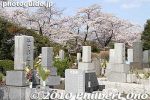
Cherry blossoms and graves at Tama Cemetery.
|
|
|
|
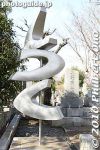
Elaborate grave sculpture.
|
|
|
|
|
|
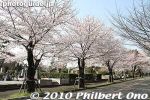
Some of the best sakura trees are on this main road.
|
|
|
|
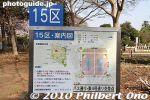
Cemetery map and sign.
|
|
|
|
|
|
|
|
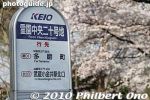
Bus stop for JR Musashi-Koganei Station.
|
|
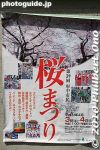
Fuchu has Sakura-dori road lined with cherry blossoms in early April. Where they hold the cherry blossom festival. Near Fuchu Station on the Keio Line from Shinjuku.
|
|
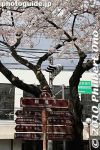
Sakura-dori road in Fuchu.
|
|
|
|
|
|
|
|

Sculpture in a park in Fuchu, Tokyo.
|
|
|
|
|
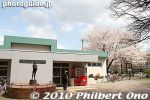
Fuchu pool
|
|
|
|
|
|
|
|
|
|
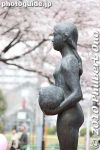
Sculpture in front of Fuchu Pool in Tokyo.
|
|
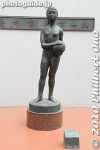
Sculpture in front of Fuchu Pool in Tokyo.
|
|
|
|
|
|
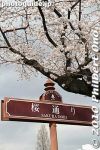
Sakura-dori road with cherry blossoms.
|
|
|

The Kurayami Matsuri is Okunitama Shrine's most important festival held annually on April 30-May 6 in Fuchu, Tokyo. The main festival days are May 4 and 5. Kurayami means "pitch dark" in reference to it originally being a night festival.
|
|

It was pitch dark because humans were not allowed to see the god's divine spirit being transferred from the shrine to the mikoshi and transported to the Otabisho rest place.The festival is near Fuchu Station on the Keio Line.
|
|
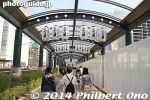
Today, the festival is well lit in the evening with paper lanterns. On May 4 from 5 pm to 6 pm, large taiko drums (太鼓の響宴) are beaten on the street.
|
|
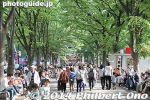
Keyaki-dori road of trees leading to Okunitama Shrine.
|
|
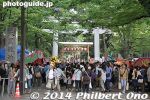
Okunitama Shrine's torii
|
|
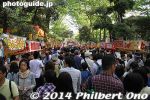
Crowded path to Okunitama Shrine.
|
|

Best to watch my video of Kurayami Matsuri on May 4, 2014.
|
|

First a giant taiko drum passed by me as I was going to the shrine.
|
|
|
|
|
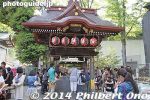
Wash basin to purify yourself.
|
|

About Okunitama Shrine
|
|

Okunitama Shrine's Honden in Fuchu, Tokyo. The shrine was established in 111 by Emperor Keiko (景行天皇). It worships six deities from Musashino Province.
|
|
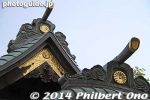
The main god is Okunitama-no-Okami, god of nation-building. Same god as Izumo Taisha.
|
|
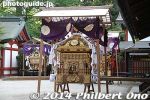
Mikoshi at the shrine await.
|
|
|
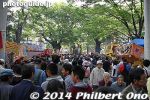
Giant taiko ahead next to the torii.
|
|
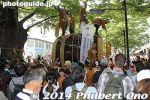
Giant taiko drum beating like the sound of dinosaur footsteps.
|
|
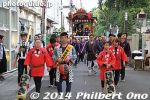
The floats started to gather.
|
|
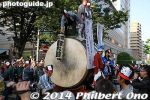
On May 4 from 5 pm to 6 pm, large taiko drums (太鼓の響宴) were beaten on the street near the shrine.
|
|
|
|
|
|
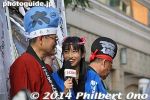
Local TV reporter.
|
|
|
|
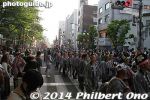
Another taiko arrives.
|
|
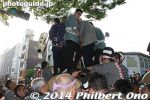
Men standing precariously on one of the smaller taiko drums. They hold on to a rope tied to the drum. The smallest taiko is 1.29 meter wide. Up to 11 people stand on it.
|
|
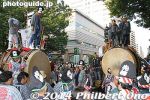
The largest taiko is made of bubinga wood. They even made another taiko from the wood carved out of this trunk.
|
|
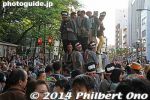
In the old days, they used to ram the taiko drums at each other. Since a bigger taiko was more advantageous, four neighborhoods sought to make the largest drum.
|
|
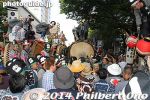
That's how the taiko got bigger and bigger.
|
|
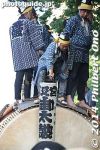
The taiko drums are beaten to purify the path for the mikoshi portable shrine.
|
|
|
|
|
|
|
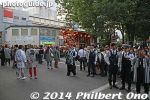
At around 6 pm, the ornate floats started to appear.
|
|
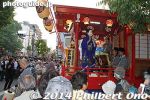
The floats carry festival musicians and dancers wearing a mask.
|
|
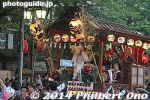
From 6 pm to 9 pm on May 4, 22 ornate wooden floats carrying musicians and dancers paraded on the street in front of the shrine (山車の巡行).
|
|
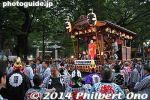
Comical dancers wearing masks performed on the floats.
|
|
|
|
|

This unusual float named Kotobuki-cho is a danjiri float whose front end has to be lifted to turn.
|
|

Each float was led by paper lantern bearers followed by people pulling the float.
|
|
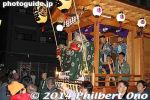
Shishimai lion dancers.
|
|
|
|
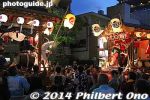
Floats would meet up and perform together for a few minutes.
|
|
|
|
|
|
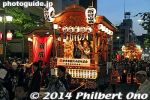
The road is not that long so it was easy to see all the floats.
|
|
|
|
|
|
|
|
|
|
|
|
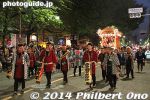
The floats later paraded on the tree-lined Keyaki road.
|
|
|
|
|
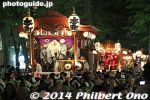
Floats on Keyaki road.
|
|
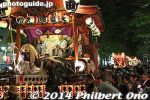
The festival music is called Fuchu Hayashi (府中囃子) native to Fuchu. There are two schools: Meguro-ryu (lively music west of the shrine) and Funabashi-ryu (elegant music east of the shrine).
|
|

They play the flute (笛), shime-daiko drum (締太鼓), large taiko (大太鼓), hand bell (鉦), and wooden clappers (拍子木). The flutist is like the music conductor who directs the music.
|
|
|
|
|
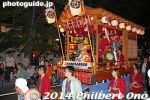
Kurayami Matsuri in Fuchu, Tokyo
|
|
|
|
|
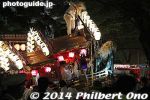
People cheer whenever they tilt this danjiri float.
|
|
|
|
|
|
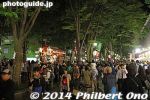
On May 4, the float parade ended at about 9 pm.
|
|
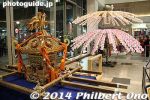
On May 4 during the day, they had children carrying small mikoshi. They also had twirling flower umbrellas called mando 万灯.
|
|
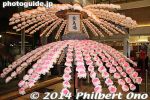
Mando flower umbrella displayed in a dept store.
|
|
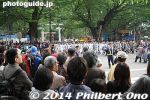
I went back to Fuchu the next day on May 5, 2014, the festival climax. Very crowded in front of the shrine.
|
|
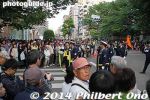
People couldn't cross the road.
|
|
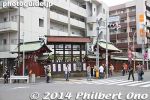
On May 5 at 6 pm, the festival climaxes with six large taiko drums followed by eight mikoshi portable shrines carried to the Otabisho, a short distance away pictured here..
|
|
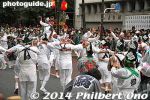
The mikoshi bearers arrived dancing in circles.
|
|
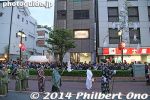
The formal procession started with some musicians.
|
|
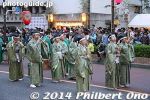
Sacred music gagaku musicians.
|
|
|

Also see my Kurayami Matsuri video taken on May 5, 2014.
|
|
|
|
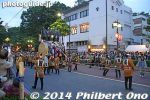
The giant taiko drums appeared again to purify the path for the mikoshi portable shrines.
|
|
|
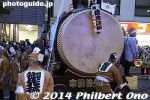
Watch the video to see how they beat the taiko.
|
|
|
|
|
|
|
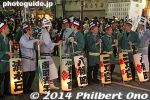
Each mikoshi was led by paper lantern bearers.
|
|

The first mikoshi was Ichinomiya. 一之宮 Ono no Okami 小野大神 小野神社 東京都多摩市鎮座 (延喜式内論社・旧郷社)
|
|

Second mikoshi was Ninomiya 二之宮 Ogawa no Okami 小河大神 二宮神社(小河神社) 東京都あきる野市鎮座 (旧郷社).
|
|
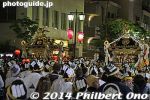
Third mikoshi was Sannomiya 三之宮 Hikawa no Okami 氷川大神 氷川大社 埼玉県大宮市鎮座 (延喜式内 名神大社・旧官弊大社).
|
|
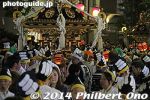
Eight mikoshi proceeded from Okunitama Shrine to the Otabisho.
|
|
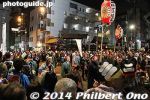
The action and crowds shift to the Otabisho seen in the background.
|
|
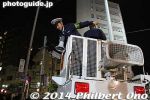
Police constantly warned people about stepping back.
|
|

All the mikoshi were brought here amid much fanfare.
|
|
|
|
|
|
|
|
|

Kurayami Matsuri: The mikoshi would spend the night at the Otabisho. At 4 am the next morning, they were carried back to the shrine by 7:30 am.
|
|
|
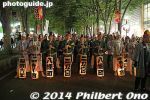
The giant taiko later paraded along the Keyaki road.
|
|

Bubaigawara Station on the Keio Line from Shinjuku. Closest station to Kyodo-no-Mori Museum. Take a bus or walk 25 min.
|
|

Statue in front of Bubaigawara Station.
|
|

Ajisai Matsuri poster for Kyodo-no-Mori Museum.
|
|

Map of Kyodo-no-Mori Museum. It is quite spacious and park-like with a modern museum, planetarium, and a few vintage buildings moved here. Also noted for flowers such as plum blossoms in Feb. and hydrangea in June when I visited.
|
|

Main drag at Kyodo-no-Mori Museum.
|
|

Former town hall building.
|
|
|
|

Inside former town hall.
|
|
|
|

Hydrangea
|
|
|
|

Garden of hydrangea in June at Kyodo-no-Mori Museum.
|
|
|

Hydrangea in full bloom.
|
|
|
|
|
|
|
|
|
|
|
|
|
|
|
|
|
|
|

Also some irises.
|
|
|
|

Thatched-roof farmer's house called the former Kouchi home. 河内家
|
|

Inside former Kouchi home. 河内家
|
|
|
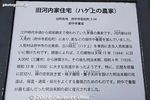
About the former Kouchi House.
|
|

Former Ochi House, another thatched-roof farmer's house.
|
|

Inside former Ochi House
|
|

About former Ochi House
|
|
|

Former Shimada Home
|
|

Former Shimada Home
|
|

Inside Former Shimada Home used as a warehouse for a drugstore.
|
|
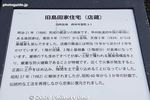
About Former Shimada Home.
|
|

Across the Shimada Home is a complex of buildings called the former Tanaka Home.
|
|

Former Tanaka Home was a rich merchant's home in Fuchu-juku post town on the Koshu Kaido Road.
|
|

Even Emperor Meiji once stopped in the Tanaka Home.
|
|
|
|
|
|
|
|

Room where Emperor Meiji stayed.
|
|

Room where Emperor Meiji stayed.
|
|

Room where Emperor Meiji stayed.
|
|
|

Former Fuchu primary school, originally built in 1935.
|
|
|
|
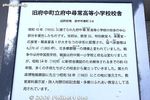
About the former primary school. This is only part of the school buildings that existed.
|
|

Inside the former primary school.
|
|

Going upstairs.
|
|

Second floor has classrooms.
|
|
|

The former classrooms are now exhibition spaces.
|
|

Different student desks.
|
|
|

Photo of the original Fuchu school.
|
|

Door to Principal's office
|
|

Inside Principal's office
|
|
|

Inside a classroom
|
|

Classroom corridor
|
|
|

School auditorium
|
|

Inside the school auditorium issome art work by former students during the 1930s.
|
|
|
|